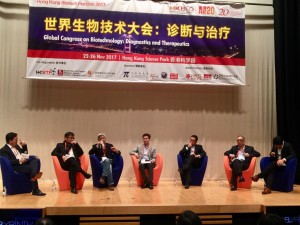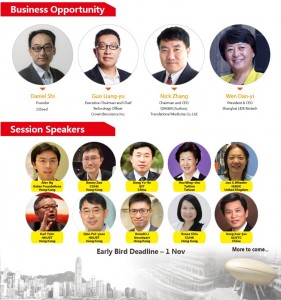A talk was presented in the session on “The role of Big Data Analytics, Machine Learning and AI in Clinical Trials and The Prospects of Hong Kong in Clinical Trial Research” on 24 November 2017 in the Hong Kong Science and Technology Parks.
The role of Big Data, Analytics, Machine Learning and AI in Clinical Trials and The Prospects of Hong Kong in Clinical Trial Research
By Professor Benny Zee, Division of Biostatistics, Jockey Club School of Public Health and Primary Care, The Chinese University of Hong Kong
Due to rapid science and technology advancement in the last decades, we now possess high personal computing power, increased data mobility due to internet, and efficient cloud computing environment that gives us unlimited resources to store and process information. Big data generation is, therefore, a natural consequence, but big data is usually associated with unstructured, potentially bias, and highly confluent data. Sometimes the term “big data” is synonymous with “messy data”.
Traditionally, clinical trial data were used to be highly structured due to rigid requirements of scientific integrity and serious consideration of human ethical concerns, A lot of statistical designs and methodologies were developed because of their ability to make definitive efficacy conclusions and patients’ safety assessments, e.g. interim analysis, data monitoring, etc.
Most people feel that big data alone would not have much impact on the highly regulated world of a clinical trial. However, big data, together with sophisticated analytic and machine learning, may provide a disruptive effect on the existing clinical trial practice. In this talk, a few selected topics and applications will be discussed: 1) patient recruitment strategy using big data analytic; 2) risk-based monitoring will become more sophisticated; 3) data management can be done in real-time to rapidly identify safety or operational signals requiring action to avoid significant and potentially costly issues such as adverse events and unnecessary delays; 4) advances in instrumentation through miniaturized biosensors and the evolution in smartphones and their apps allowing smart devices to gather large quantities of real-world data not previously available to scientists; 5) remote monitoring of patients through sensors and devices represents an immense opportunity. This kind of data could be used to facilitate R&D, analyze drug efficacy, enhance future drug sales, and create new economic models that combine the provision of drugs and services; 6) it may enhance the use of “large simple trial” design to be implemented in regular patient care settings, making each clinical encounter a learning opportunity. This idea has not been taken seriously in the past because the statistical methodology to draw a meaningful conclusion based on this type of study has a lot of limitations and challenges. However, machine learning and AI may change the situation and provides reasonable arguments to deal with complex effects.
The prospect of Hong Kong in clinical trials research is going to rely on how much we can be at the forefront development of science and technology and how innovative and disruptive is our inventions. The ability to develop a smart trial design, sophisticated analytic methods for data management, advancement in device development, and ideas that may take the lead in drug development, all of these will determine where we are in the spotlight of clinical trial research.








